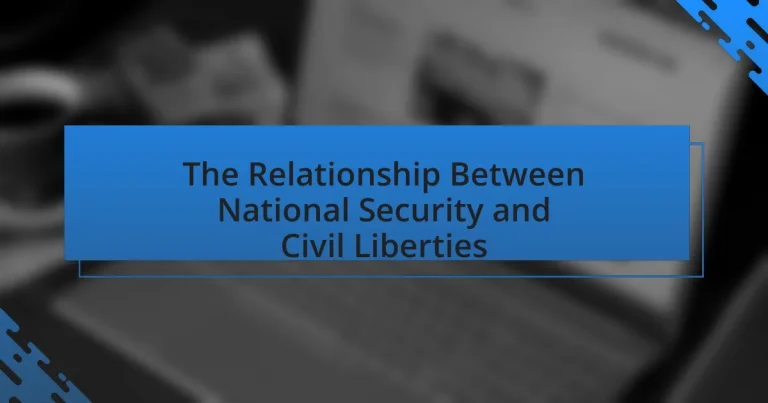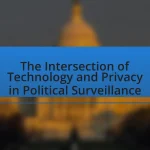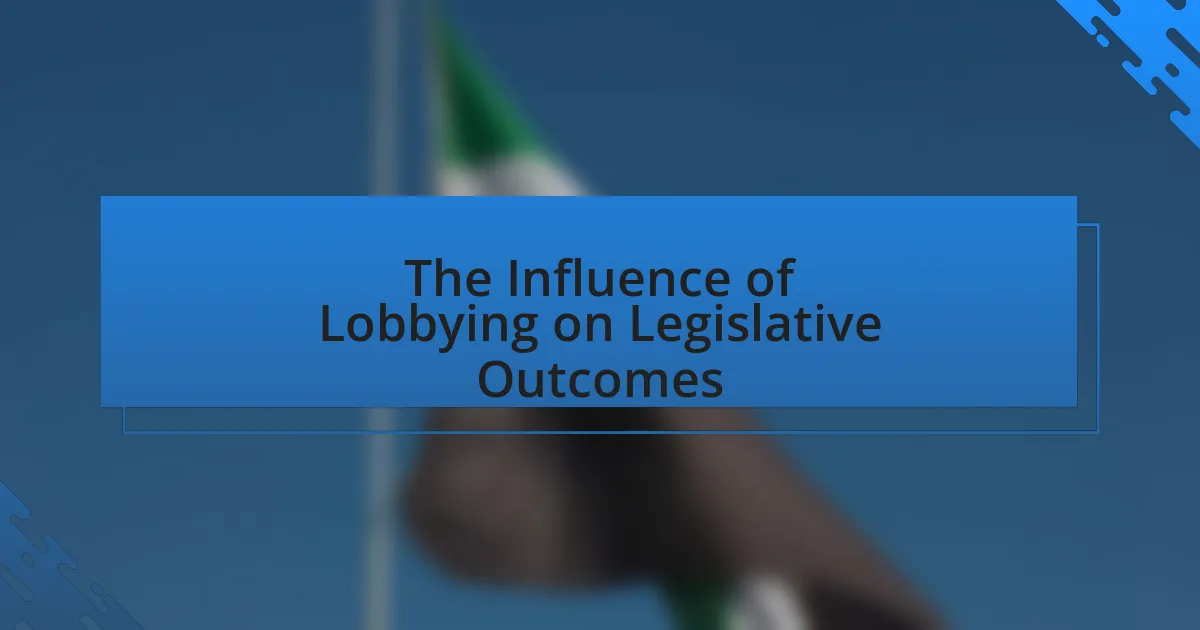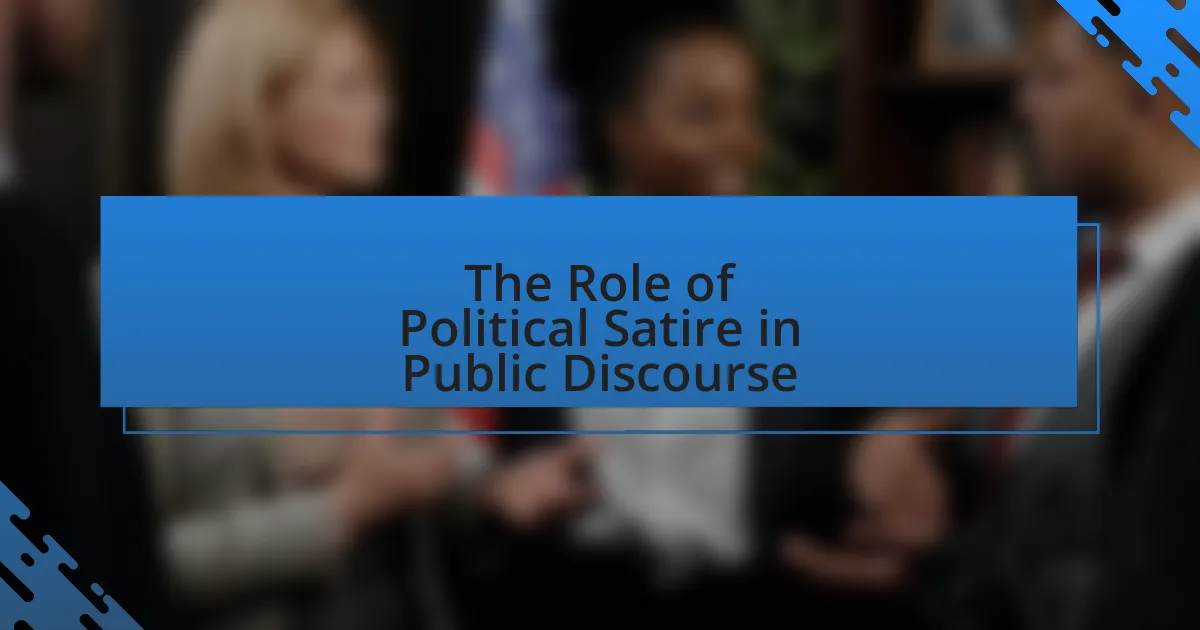The article examines the complex relationship between national security and civil liberties, highlighting the inherent tension that arises when security measures infringe upon individual freedoms. It discusses how national security policies, such as the USA PATRIOT Act, can lead to significant restrictions on civil liberties, including privacy rights, freedom of speech, and due process. The article also explores historical examples, current debates, and the role of technology in shaping this dynamic, emphasizing the importance of maintaining a balance between protecting citizens and preserving their rights. Additionally, it addresses the implications of prioritizing security over civil liberties and the potential consequences for democracy and societal trust.
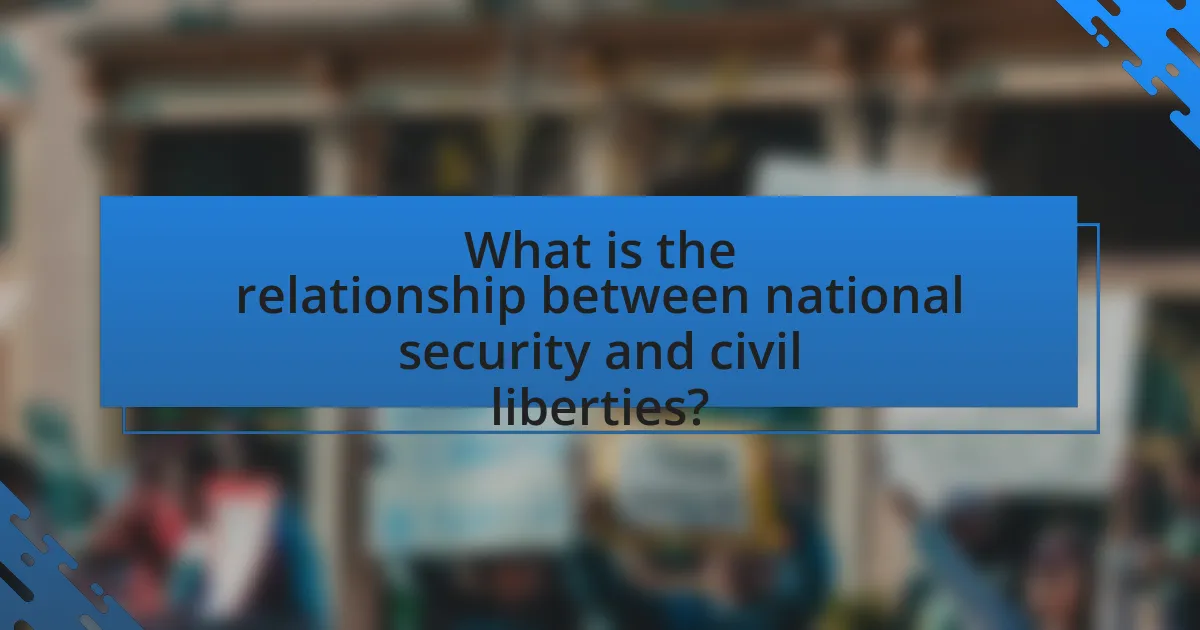
What is the relationship between national security and civil liberties?
The relationship between national security and civil liberties is often characterized by tension, as measures taken to enhance security can infringe upon individual freedoms. For instance, during times of crisis, governments may implement surveillance programs or restrict free speech to prevent threats, as seen in the USA PATRIOT Act enacted after the September 11 attacks, which expanded law enforcement’s surveillance capabilities. This act illustrates how national security concerns can lead to the erosion of civil liberties, raising debates about the balance between protecting citizens and preserving their rights.
How do national security measures impact civil liberties?
National security measures often restrict civil liberties by implementing surveillance, limiting freedom of expression, and enabling detention without trial. For instance, the USA PATRIOT Act, enacted after the September 11 attacks, expanded government surveillance capabilities, which critics argue infringed on privacy rights. Additionally, the use of counter-terrorism laws has led to increased scrutiny of individuals based on their ethnicity or religion, raising concerns about discrimination and the erosion of due process. Historical examples, such as the internment of Japanese Americans during World War II, illustrate how national security concerns can lead to significant civil liberties violations.
What specific civil liberties are often affected by national security policies?
National security policies often affect civil liberties such as the right to privacy, freedom of speech, and the right to due process. For instance, surveillance programs implemented for national security purposes can infringe upon individuals’ privacy rights, as seen in the revelations about the National Security Agency’s data collection practices. Additionally, national security measures can lead to restrictions on freedom of speech, particularly regarding dissenting opinions or criticism of government actions, as evidenced by laws that criminalize certain forms of protest or expression in the name of security. Furthermore, the right to due process can be compromised through practices such as indefinite detention without trial, which has been observed in cases involving terrorism suspects. These examples illustrate how national security policies can significantly impact fundamental civil liberties.
How do governments justify the infringement of civil liberties in the name of national security?
Governments justify the infringement of civil liberties in the name of national security by asserting that such measures are necessary to protect citizens from threats, including terrorism and espionage. For instance, after the September 11 attacks in 2001, the U.S. government enacted the USA PATRIOT Act, which expanded surveillance capabilities to prevent future attacks, arguing that these actions were essential for national safety. Additionally, governments often cite the need for intelligence gathering and law enforcement efficiency as reasons for limiting civil liberties, claiming that these restrictions are temporary and aimed at preserving public order and safety.
Why is the balance between national security and civil liberties important?
The balance between national security and civil liberties is important because it ensures the protection of individual rights while maintaining societal safety. When national security measures infringe upon civil liberties, it can lead to government overreach and the erosion of fundamental freedoms, as seen in historical instances like the USA PATRIOT Act, which expanded surveillance capabilities at the expense of privacy rights. Maintaining this balance is crucial for fostering trust in government and upholding democratic values, as excessive security measures can create a climate of fear and oppression, undermining the very freedoms that national security aims to protect.
What are the potential consequences of prioritizing national security over civil liberties?
Prioritizing national security over civil liberties can lead to significant erosion of individual rights and freedoms. When governments implement extensive surveillance measures, restrict free speech, or detain individuals without due process in the name of security, it undermines the foundational principles of democracy. Historical examples, such as the USA PATRIOT Act enacted after the September 11 attacks, illustrate how national security measures can result in increased government power and reduced privacy rights, leading to potential abuses and discrimination against marginalized groups. Additionally, studies have shown that excessive focus on security can foster a culture of fear and mistrust among citizens, ultimately weakening societal cohesion and democratic engagement.
How can the protection of civil liberties enhance national security?
The protection of civil liberties can enhance national security by fostering public trust and cooperation with law enforcement and government agencies. When citizens feel their rights are respected, they are more likely to report suspicious activities and collaborate with authorities, which can lead to the prevention of potential threats. For example, studies have shown that communities with strong civil liberties protections often experience lower crime rates and increased public safety, as individuals are more willing to engage with security measures. Additionally, historical instances, such as the civil rights movement, demonstrate that safeguarding civil liberties can lead to a more informed and engaged citizenry, ultimately contributing to a more resilient society capable of addressing security challenges effectively.
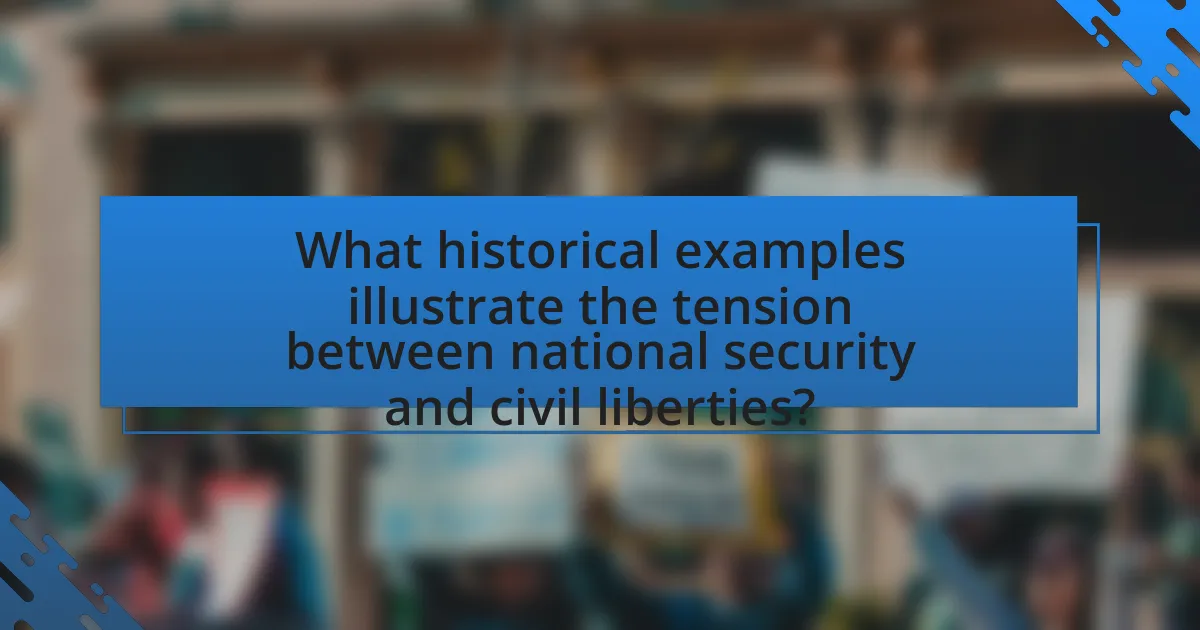
What historical examples illustrate the tension between national security and civil liberties?
Historical examples illustrating the tension between national security and civil liberties include the internment of Japanese Americans during World War II and the USA PATRIOT Act enacted after the September 11 attacks. The internment, authorized by Executive Order 9066 in 1942, forcibly relocated around 120,000 Japanese Americans to internment camps, violating their civil rights under the justification of national security concerns. Similarly, the USA PATRIOT Act, passed in 2001, expanded government surveillance capabilities and reduced checks on law enforcement, raising significant civil liberties concerns regarding privacy and due process. Both instances demonstrate how national security measures can encroach upon individual rights, often justified by perceived threats.
How did events like 9/11 reshape the national security landscape?
Events like 9/11 significantly reshaped the national security landscape by leading to the implementation of extensive security measures and policies aimed at counterterrorism. The U.S. government established the Department of Homeland Security in 2003, which consolidated various agencies to enhance coordination in national security efforts. Additionally, the USA PATRIOT Act, enacted shortly after the attacks, expanded surveillance capabilities and law enforcement powers, allowing for increased monitoring of communications and financial transactions to prevent future terrorist activities. These changes marked a shift towards prioritizing national security over certain civil liberties, as evidenced by the controversial practices of mass surveillance and data collection that emerged in the years following the attacks.
What laws were enacted post-9/11 that affected civil liberties?
The USA PATRIOT Act, enacted in October 2001, significantly affected civil liberties by expanding the government’s surveillance and law enforcement powers. This law allowed for increased monitoring of communications, including phone and internet usage, and enabled law enforcement to conduct searches without warrants in certain circumstances. Additionally, the Homeland Security Act of 2002 established the Department of Homeland Security, which further centralized national security efforts and raised concerns about privacy and civil rights. These laws were justified by the government as necessary for national security but faced criticism for infringing on individual freedoms and due process rights.
How did public opinion shift regarding civil liberties after major security events?
Public opinion regarding civil liberties typically shifts towards increased support for security measures following major security events. For instance, after the September 11 attacks in 2001, surveys indicated a significant rise in public willingness to accept government surveillance and restrictions on civil liberties in the name of national security. According to a Pew Research Center study conducted shortly after the attacks, 63% of Americans expressed support for increased government surveillance of suspected terrorists, reflecting a prioritization of security over civil liberties during times of crisis. This trend often results in temporary acceptance of policies that may infringe on individual rights, as seen with the USA PATRIOT Act, which was enacted shortly after 9/11 and expanded government powers for surveillance and law enforcement.
What lessons can be learned from past conflicts between national security and civil liberties?
Past conflicts between national security and civil liberties illustrate the importance of balancing security measures with the protection of individual rights. Historical examples, such as the internment of Japanese Americans during World War II, demonstrate that national security policies can lead to significant violations of civil liberties, resulting in long-lasting harm to affected communities. Additionally, the USA PATRIOT Act, enacted after the September 11 attacks, raised concerns about surveillance and privacy, highlighting the need for oversight and accountability in security practices. These instances underscore the necessity of ensuring that security measures do not infringe upon fundamental rights, emphasizing the value of transparency and public discourse in shaping policies that respect both security and civil liberties.
What role did the judiciary play in balancing these interests historically?
The judiciary historically played a critical role in balancing national security and civil liberties by interpreting laws and adjudicating cases that involved conflicts between these two interests. Landmark Supreme Court cases, such as Korematsu v. United States in 1944, demonstrated the judiciary’s involvement in national security matters, where the Court upheld the internment of Japanese Americans during World War II, prioritizing perceived security needs over individual rights. Conversely, in cases like United States v. Nixon in 1974, the judiciary reinforced civil liberties by asserting that no one, not even the President, is above the law, thereby protecting constitutional rights against governmental overreach. These judicial decisions illustrate the ongoing tension and negotiation between safeguarding national security and upholding civil liberties throughout American history.
How have civil rights movements influenced national security policies?
Civil rights movements have significantly influenced national security policies by advocating for the protection of individual liberties and challenging government overreach. For instance, the civil rights movement of the 1960s led to the establishment of legal frameworks, such as the Civil Rights Act of 1964, which aimed to prevent discrimination and protect citizens’ rights, thereby impacting how national security measures were implemented. Additionally, the post-9/11 era saw civil rights organizations, like the American Civil Liberties Union, actively contesting policies such as the USA PATRIOT Act, arguing that they infringed upon civil liberties. This ongoing dialogue has resulted in a more cautious approach to national security policies, emphasizing the need to balance security measures with the protection of civil rights.
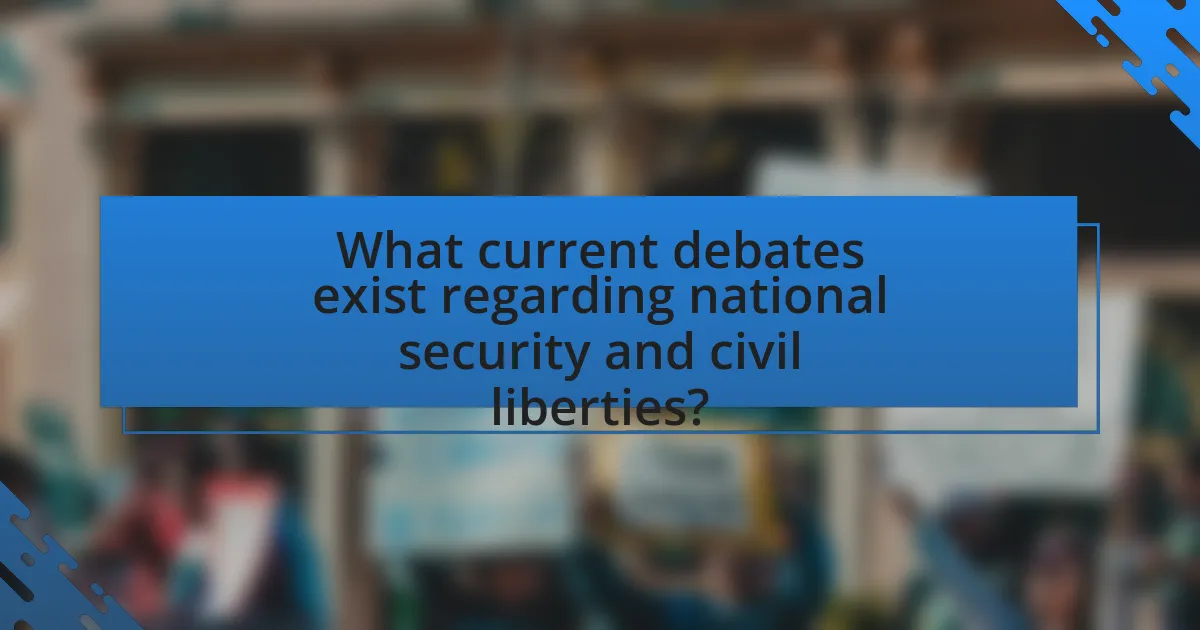
What current debates exist regarding national security and civil liberties?
Current debates regarding national security and civil liberties center on the balance between protecting citizens and preserving individual rights. Key issues include government surveillance practices, such as those revealed by Edward Snowden, which raised concerns about privacy violations under the USA PATRIOT Act. Additionally, the use of counterterrorism measures often leads to discussions about racial profiling and the treatment of minority communities, as seen in the backlash against the Muslim Ban. Legal challenges to laws like the Foreign Intelligence Surveillance Act (FISA) highlight ongoing tensions between security needs and constitutional protections. These debates are fueled by public opinion, legal interpretations, and the evolving nature of threats, making the discourse dynamic and contentious.
How are technology and surveillance impacting civil liberties today?
Technology and surveillance are significantly impacting civil liberties today by enabling extensive monitoring and data collection on individuals, often without their consent. This pervasive surveillance, facilitated by advancements in artificial intelligence and data analytics, raises concerns about privacy violations and the erosion of personal freedoms. For instance, a report by the Electronic Frontier Foundation highlights that government agencies increasingly utilize technologies like facial recognition and location tracking, which can lead to unwarranted intrusions into citizens’ lives. Furthermore, the 2021 Freedom House report indicates that 79 countries have implemented laws that allow for mass surveillance, often justified under the guise of national security, thereby compromising civil liberties globally.
What are the implications of data collection on individual privacy rights?
Data collection significantly impacts individual privacy rights by enabling the surveillance and tracking of personal information without consent. This intrusion can lead to a chilling effect on free expression and association, as individuals may alter their behavior knowing they are being monitored. For instance, the USA PATRIOT Act expanded government surveillance capabilities post-9/11, raising concerns about the erosion of privacy rights in the name of national security. Studies indicate that increased data collection correlates with heightened public anxiety regarding privacy, as evidenced by a 2019 Pew Research Center survey showing that 81% of Americans feel they have little to no control over the data collected about them.
How do social media and digital communication challenge traditional notions of civil liberties?
Social media and digital communication challenge traditional notions of civil liberties by facilitating mass surveillance and enabling the spread of misinformation. The rise of platforms like Facebook and Twitter has led to increased government monitoring of online activities, often justified in the name of national security, which can infringe on individuals’ rights to privacy and free expression. For instance, the USA PATRIOT Act, enacted after the September 11 attacks, expanded the government’s ability to surveil citizens, raising concerns about the erosion of civil liberties. Additionally, the rapid dissemination of false information on these platforms can undermine democratic processes and public trust, further complicating the balance between security and individual rights.
What are the arguments for and against increased national security measures?
Increased national security measures are argued to enhance safety and prevent terrorism, as evidenced by the implementation of policies like the USA PATRIOT Act, which aimed to improve intelligence sharing and surveillance capabilities post-9/11. Proponents assert that these measures can deter threats and protect citizens from potential attacks, citing a decrease in terrorist incidents in countries with robust security protocols.
Conversely, arguments against increased national security measures focus on the infringement of civil liberties and privacy rights. Critics highlight that excessive surveillance and data collection can lead to government overreach and abuse of power, as seen in the revelations by Edward Snowden regarding the NSA’s mass surveillance programs. They argue that such measures can create a climate of fear and mistrust among citizens, undermining democratic values and personal freedoms.
How do proponents of national security argue their case?
Proponents of national security argue their case by emphasizing the necessity of protecting citizens from external threats and maintaining national stability. They assert that robust security measures are essential to prevent terrorism, cyberattacks, and other forms of violence that could endanger public safety. For instance, after the September 11 attacks, the U.S. government implemented the Patriot Act, which proponents claimed was vital for enhancing surveillance capabilities to thwart potential threats. They often cite statistics indicating a rise in global terrorism and the need for preemptive actions to safeguard national interests. Additionally, advocates argue that a secure nation fosters economic stability and allows for the protection of civil liberties in the long run, as a secure environment is deemed necessary for the exercise of those liberties.
What counterarguments do civil liberties advocates present?
Civil liberties advocates present counterarguments emphasizing that national security measures often infringe upon individual rights and freedoms. They argue that excessive surveillance and data collection violate privacy rights, as seen in the backlash against the USA PATRIOT Act, which critics claim led to unwarranted government intrusion. Additionally, advocates highlight that the erosion of civil liberties can lead to a culture of fear and repression, undermining democratic values. Historical examples, such as the internment of Japanese Americans during World War II, illustrate the dangers of prioritizing security over civil rights, demonstrating that such actions can result in long-lasting harm to marginalized communities.
What practical steps can individuals take to protect their civil liberties in the context of national security?
Individuals can protect their civil liberties in the context of national security by staying informed about their rights and advocating for transparency in government actions. Engaging in community discussions and supporting organizations that promote civil liberties, such as the American Civil Liberties Union (ACLU), empowers individuals to challenge policies that infringe on personal freedoms. Additionally, utilizing privacy tools like encrypted communication apps and being cautious about sharing personal information online can help safeguard individual rights against unwarranted surveillance. Historical instances, such as the backlash against the USA PATRIOT Act, demonstrate the importance of public advocacy in maintaining a balance between national security and civil liberties.
